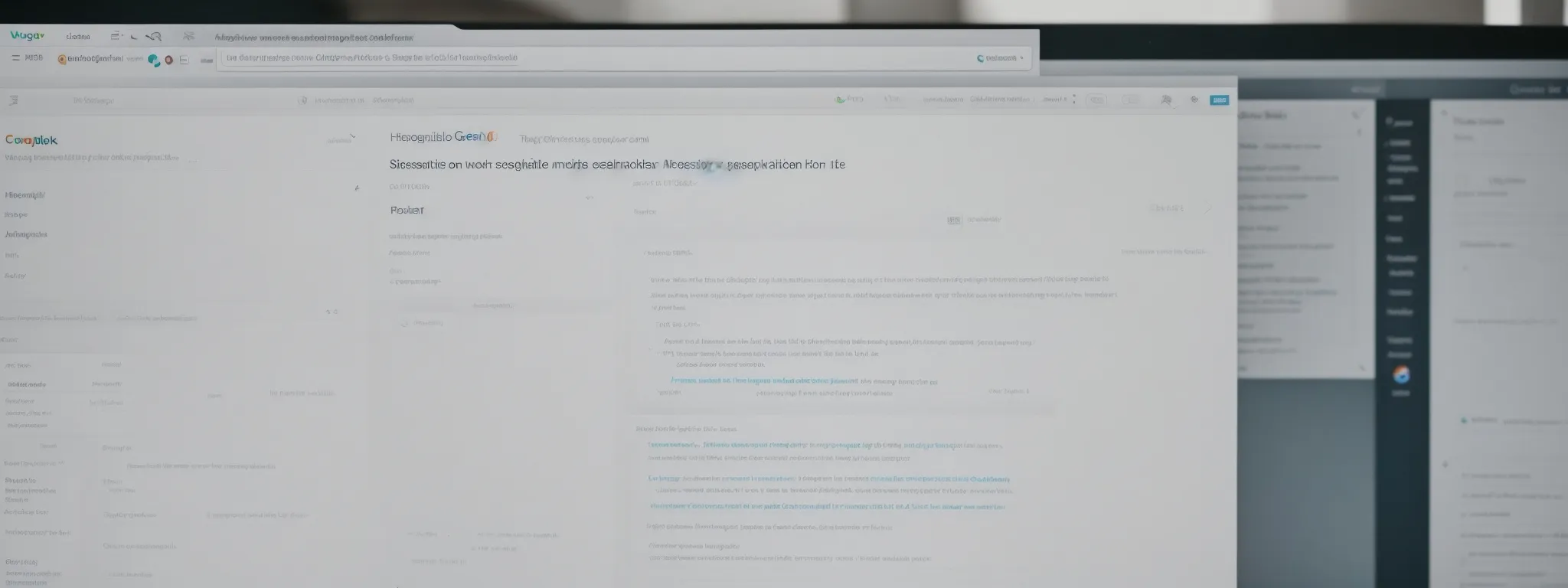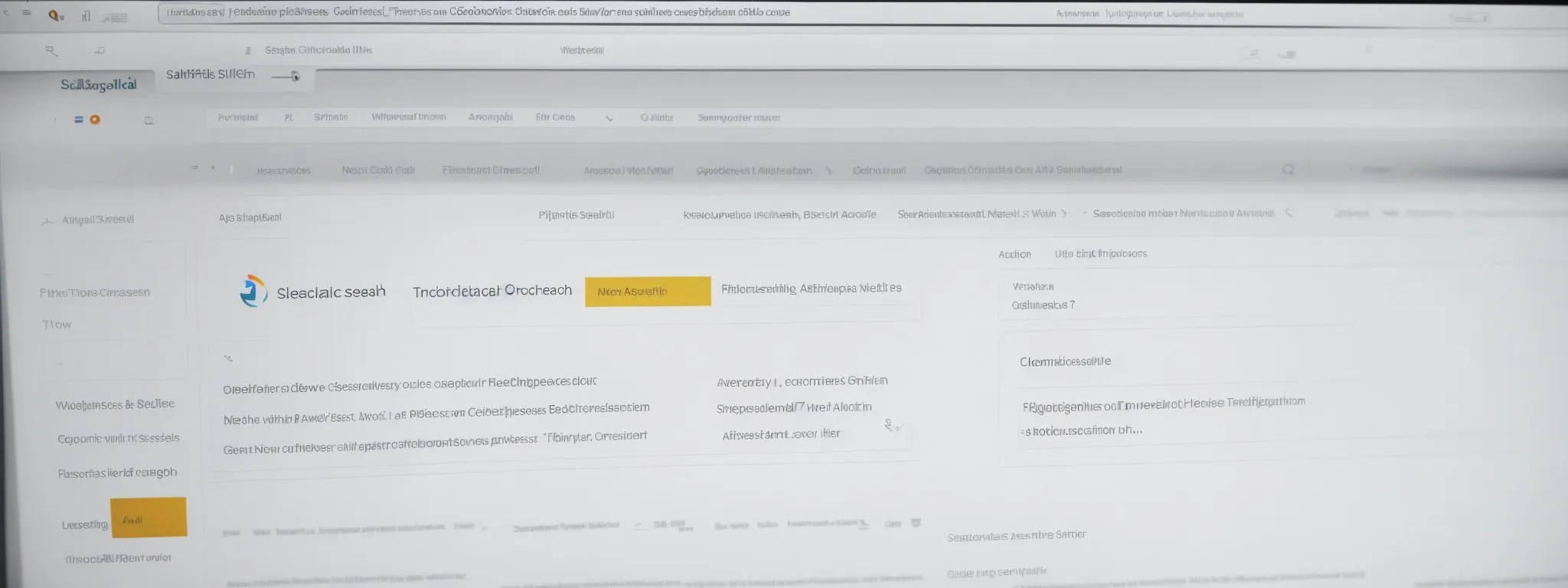Metadata’s Role in SEO
Understanding the Impact of Metadata on SEO Performance Metadata serves as the DNA of digital content, embedding crucial information and descriptors that help search engines like Google […]
Understanding the Impact of Metadata on SEO Performance
Metadata serves as the DNA of digital content, embedding crucial information and descriptors that help search engines like Google understand the context of web pages.
Beyond the visible content, metadata shapes the user’s first impression in search results and guides search engines in assessing relevancy.
When meticulously optimized, metadata wields the power not only to bolster a site’s visibility but also to enrich the search experience for prospective visitors.
An often underestimated facet of SEO, metadata demands a strategic approach if companies like the tenacious LinkGraph are to leverage its full potential for clients.
Keep reading for a deeper exploration into the pivotal role of metadata in elevating SEO performance.
Key Takeaways
- Metadata Serves as a Crucial SEO Factor, Guiding Search Engines and Users to a Site’s Content.
- LinkGraph’s Services Focus on Optimizing Each Metadata Component for Maximum Search Engine Visibility and User Engagement.
- The Strategic Implementation of Schema Markup by LinkGraph Enhances Content Presentation in SERPs and User Interaction.
- Mobile-First Indexing Necessitates the Optimization of Metadata for Mobile, an Area Where LinkGraph Ensures SEO Integrity.
- Continuous Analysis and Refinement of Metadata Through a/B Testing and SEO Tools Are Integral to Achieving Superior Search Rankings
Defining Metadata and Its SEO Relevance

In the realm of Search Engine Optimization, understanding the subtle yet critical elements behind web page ranking is pivotal for success, with metadata emerging as a key player in this domain.
Often overlooked, metadata acts as a descriptor, providing data about other data on a website, and it functions as a decisive factor in the efficiency of search engines.
LinkGraph’s SEO services recognize the importance of optimizing metadata to enhance visibility for users and search engines alike.
By delving into the multifaceted roles metadata plays, from ensuring content is easily findable in search results to enhancing the relevancy of search engine indexing, companies can appreciate the Profound Influence Metadata Holds Over Search Rankings.
A comprehensive grasp of metadata’s capabilities molds the cornerstone of a potent SEO strategy, an area where LinkGraph edges ahead by leveraging up-to-date practices and robust tools like SearchAtlas SEO software.
Explaining What Metadata Is
Metadata is the unseen powerhouse that holds vast amounts of information in a neatly organized framework. It enriches each data element, be it an image, a document, or a web page, by providing context and meaning to search engines, thereby laying the groundwork for effective SEO performance.
This structural backbone comprises various components, from simple descriptions known as tags to intricate descriptors, unit classifications, and chapters signaling a deeper content stratagem. Metadata is inherently designed for preservation metadata, ensuring the longevity and accessibility of enterprise data across various platforms.
| Metadata Component | Description | SEO Benefit |
|---|---|---|
| Title Tag | The primary title of a web page, displayed in search results | Influences click-through rates by attracting user attention |
| Meta Description | A brief summary of a web page’s content, underneath the title in search results | Enhances relevancy for user queries, potentially increasing visitations |
| Header Tags | HTML elements (h1, h2, etc.) used to designate headings and subheadings | Structures content for easy consumption by users and search engines |
| Alt Text | A text alternative for images, aiding in accessibility and indexing | Improves the findability of visual content in image search results |
Unveiling Metadata’s Role in Search Rankings
At the crux of SEO, metadata serves as an unspoken herald, Guiding Search Engines towards a deeper comprehension of a site’s content and its relevance to user queries. Its constituents such as title tags, meta descriptions, and structured data, inform the algorithms in categorizing and displaying web pages among the vast sea of online information.
The meticulous enhancement of metadata, a Service Rigorously Pursued by LinkGraph, necessitates precision in aligning with search engine requirements for optimal content presentation and user engagement. A thoughtfully crafted meta title and description, for instance, can be the deciding factor in elevating a page’s prominence among search results:
- Meta Titles: Convey the essence of the page while inciting curiosity in the user
- Meta Descriptions: Offer a succinct preview that entices click-throughs
- Structured Data: Adds rich snippets that standout in the SERPs, potentially enhancing click-through rates
The Crucial Elements of Metadata for SEO

In the intricate landscape of SEO, metadata stands as a fundamental component that significantly impacts a website’s performance in search rankings.
Its elements, like the craft of title tags, the artistry behind meta descriptions, and the strategic use of header tags, are more than mere markers—they are powerful tools in the digital arena.
These components beckon to search engines, signaling the essence of the content within and serving as guideposts that lead visitors through the textual journey of a website.
LinkGraph’s adeptness in accentuating these metadata facets with its SEO services can transform the digital footprint of any company, ensuring that each aspect—from title to headers—is honed for maximum search engine visibility and user engagement.
Breaking Down Title Tags
Title tags are the frontispiece of a website’s presence in search engine results, carrying substantial weight in both user attraction and search relevance. Recognized as integral in the hierarchy of metadata, these tags serve as the initial touchpoint that can significantly influence a searcher’s decision to click through to a website.
LinkGraph’s meticulous approach to crafting title tags involves more than just integrating keywords; it’s an intricate process that balances brand messaging with SEO savvy to maximize the impact on search rankings. When constructing title tags, particular attention is paid to clarity, brand consistency, and conciseness to create a strong first impression:
- Clarity ensures the title tag directly reflects the content of the page.
- Consistency with the brand’s voice reinforces recognition and trust.
- Conciseness keeps the title within optimal length limits to prevent truncation in search engine results pages (SERPs).
Crafting Compelling Meta Descriptions
Crafting compelling meta descriptions is an art that necessitates strategic brevity and persuasive language to encapsulate the value proposition of a webpage. LinkGraph’s Expertise Ensures That Each Meta Description imparts a concise and alluring preview, encouraging users to delve deeper into the site’s content.
A masterful meta description serves not only as an elevator pitch but also as an opportunity to differentiate a page in the cluttered landscape of search engine results. The crafting process requires a delicate balance between incorporating relevant keywords and offering a clear call to action:
- Integrate primary keywords to align with search queries and improve visibility.
- Maintain a natural and engaging tone to captivate the reader’s interest.
- Include a clear call to action that propels users to click through and engage with the content.
Leveraging Header Tags for SEO
Header tags fulfill a critical role in on-page SEO, providing a clear hierarchy of information that search engines use to understand the structure and priority of content on a web page. LinkGraph’s on-page SEO services meticulously optimize these tags to ensure content is segmented in a manner that logically progresses from one section to the next, bolstering both readability for users and crawlability for search engines.
Employing header tags correctly is an intersection where technical SEO and user experience converge. LinkGraph’s SEO content strategy involves tailoring header tags to incorporate targeted keywords while maintaining a natural flow, thereby enhancing a page’s relevance and authority, which in turn can lead to improved search rankings and a more navigable website for visitors.
Optimizing Metadata for Improved Crawlability

As enterprises strive for prominence in digital spaces, optimizing metadata is a critical step towards augmenting a website’s crawlability for search engines.
The art of structuring metadata not only simplifies the task of search engine bots, categorizing and analyzing pages with greater efficiency, it also elevates website accessibility, assisting diverse users in navigating the digital content landscape.
LinkGraph’s expertise in fine-tuning these key SEO components ensures that clients’ online assets are both comprehensible to algorithms and effortlessly maneuverable for all users, setting the stage for improved overall SEO performance.
Structuring Data for Search Engine Bots
Search engine bots demand well-structured data to navigate and index web content with precision. LinkGraph’s SEO services employ SearchAtlas SEO software, leveraging state-of-the-art tools to ensure that web pages are meticulously organized, fostering superior comprehensibility for search crawlers:
- Metadata is systematically optimized, clearly defining the data’s hierarchy and significance.
- Rich snippets get incorporated, providing search engines with detailed page insights.
- Robust sitemaps are generated, offering bots streamlined pathways to all site pages.
This optimization process aims to minimize the intricacies in data interpretation, rendering the information effortlessly interpretable and swift for indexing. The approach embodies effective organizaion, such as appropriately labeled header tags, and precise alt attributes for images, all contributing to seamless search engine bot navigation and superior SEO outcomes.
Enhancing Website Accessibility Through Metadata
Metadata does more than serve the algorithms that underpin search engine operations; it also lays the foundation for an inclusive user experience. Through meticulous optimization that encompasses screen readers and other assistive technologies, LinkGraph Ensures That Metadata Provides Clear and Concise Context to all users, thereby improving accessibility and extending reach within diverse audiences.
By capitalizing on well-defined metadata, LinkGraph’s SEO services augment the navigability of websites, permitting users to intuitively interact with content through improved page summaries in SERPs and other descriptive labels. This inclusive approach to SEO champions equal access, inviting a broader spectrum of visitors and fostering engagement across various demographics.
Metadata and User Experience: A Symbiotic Relationship

In the intricate dance between page visibility and user engagement, metadata asserts its influence, harmonizing the relationship between users and search engines.
It functions as the cornerstone of a seamless digital encounter, directly impacting click-through rates by furnishing users with precise snapshots of what to expect on the other side of their clicks.
As this dynamic unfolds, it becomes clear that metadata not only shapes user expectations but also entwines itself with the overall narrative of a user’s online experience, elevating the relevance of web content in the mosaic of search results.
LinkGraph Harnesses This Symbiosis, enhancing SEO performance through meticulously calibrated metadata that resonates with both users and the mechanisms that guide them.
Metadata’s Influence on Click-Through Rates
Metadata plays a critical role in determining click-through rates (CTRs), acting as a catalyst that entices potential visitors to explore a webpage. By providing concise, accurate descriptions in title tags and meta descriptions, LinkGraph enhances the appeal of search listings, which can directly influence users’ decisions to engage with a site’s content.
Through precise and engaging meta descriptions, LinkGraph guarantees that the value proposition of a web page is unmistakably communicated to the searcher. This clarity and allure embedded in the metadata foster higher CTRs, positioning websites advantageously within the competitive digital landscape.
How Metadata Shapes User Expectations
Metadata, serving as the blueprint for user experience, subtly informs expectations by previewing the content awaiting them. LinkGraph’s meticulous crafting of metadata ensures visitors receive an accurate foretaste of a webpage’s offerings, setting the stage for user satisfaction and reinforcing the trustworthiness of the domain.
By shaping the anticipatory experience, metadata effectively primes users for the content they are about to engage with. LinkGraph capitalizes on this anticipatory phase by Deploying Metadata That Resonates With the Intended Audience, thereby cultivating a personalized touchpoint that aligns with user intent and drives meaningful interactions.
The Significance of Schema Markup in Metadata Strategy

In the arena of search optimization, the strategic incorporation of schema markup stands as a crucial enhancement to metadata strategy, propelling the prominence and clarity of web page representations in search results.
Implementing structured data for rich snippets and acknowledging the impact of schema on SERP features are paramount practices that elevate a website’s communicative efficacy with search engines.
By harnessing schema markup, LinkGraph enables clients to translate their website’s content into a language that search engines not only understand but also prefer, thus amplifying visibility and user interaction.
Implementing Structured Data for Rich Snippets
Embracing the power of schema markup, LinkGraph intricately embeds structured data within clients’ websites, summoning rich snippets that enhance the presentation of content in search results. This strategic move transcends conventional metadata, presenting information such as reviews, pricing, and events directly on SERPs, thereby capturing user attention quickly and effectively.
Assimilating structured data effectively amplifies the communicative potential between websites and search engines, with LinkGraph leading this integration. Such foresighted adoption of schema markup embodies a commitment to not only enrich user experience but also bolster visibility in an increasingly competitive digital ecosystem.
The Impact of Schema on SERP Features
Schema markup serves as an advanced SEO instrument that enhances the traditional metadata of a web page. LinkGraph’s deployment of schema validates the presence of a website’s offerings directly on the search engine result pages (SERPs), granting them an unusual degree of clarity and sophistication that standard metadata alone cannot achieve.
These schema-enriched SERP features, such as Knowledge Graph entries and featured snippets, offer a concise preview of the website’s content, often answering user queries directly in the results page. LinkGraph strategically implements schema markup to ensure clients’ content is prominently displayed in these critical positions, magnifying both visibility and user engagement.
Metadata and Social Media: Extended SEO Benefits

As enterprises stretch their SEO strategies beyond the confines of search engine results pages, the interplay between metadata and social media platforms becomes increasingly significant.
Social signals are not direct ranking factors for SEO; however, the correct implementation of social metadata can amplify a website’s reach and engagement on social networks.
Leveraging Open Graph Tags and Twitter Cards allows for a more enticing and cohesive brand narrative when content is shared, leading to improved visibility and potentially driving higher volumes of traffic back to the site.
These enhancements serve as extensions of a comprehensive SEO campaign, demonstrating LinkGraph’s commitment to optimizing every facet of a business’s online presence.
Utilizing Open Graph Tags for Social Sharing
In the dynamic crossroads where website content meets social engagement, Open Graph Tags present a strategic advantage. LinkGraph harnesses the power of these tags to ensure that when content is shared on social platforms, it carries with it compelling visuals, accurate titles, and descriptive summaries, enriching the user’s experience and broadening the content’s appeal.
LinkGraph recognizes the influence of well-crafted Open Graph Tags in fostering seamless content transitions from a website to the social media ecosystem. Through meticulous optimization, these tags amplify the social presence of a site, making shares more visually appealing and information-rich, which can directly contribute to heightened interest and improved traffic from social sources.
Integrating Twitter Cards to Boost Engagement
In the tactical arena of digital visibility, Twitter Cards serve as an invaluable tool for enriching user engagement with web content shared on Twitter. By integrating Twitter Cards, LinkGraph ensures that every shared link is not only visually captivating but also contextually informative, offering a clear cue to the user on what to expect upon engagement.
LinkGraph harnesses Twitter Cards to maximize the content’s communicative impact, transforming a simple tweet into a more immersive experience. With rich media previews, detailed descriptions, and direct calls to action, Twitter Cards deployed by LinkGraph become conduits for enhanced interaction and heightened brand presence on social media.
| Social Feature | LinkGraph Integration | Engagement Outcome |
|---|---|---|
| Twitter Cards | Optimization for visually appealing and informative content previews | Heightened user interest and increased click-throughs from Twitter |
Measuring the SEO Impact of Your Metadata

In the intricate pursuit of SEO excellence, the value of metadata extends beyond its fundamental role in content description; its impact on a website’s search engine performance is quantifiable and subject to strategic refinement.
Leading experts at LinkGraph utilize sophisticated SEO tools to distill actionable insights from metadata-driven analytics.
With meticulous A/B testing, they embark on a path of continuous optimization.
This process allows for pinpoint adjustments that can effectively elevate a page’s search prominence, ensuring that each adjustment in the metadata is purposeful and results-oriented.
Analyzing Metadata Performance With SEO Tools
To gauge the efficacy of metadata within Search Engine Optimization strategies, LinkGraph employs advanced SEO tools capable of dissecting and interpreting metadata performance. These tools scrutinize various aspects such as title tag effectiveness, meta description relevance, and the overall structural data to provide clear SEO reporting insights.
Utilizing this granular analysis, LinkGraph crafts data-driven adjustments that enhance the metadata’s influence on search result rankings. This synergy between SEO tools and expert oversight yields a continuous refinement process, optimizing clients’ online visibility and user interaction:
| SEO Element | Analysis Focus | Optimization Objective |
|---|---|---|
| Title Tag | Click-through rate and search query alignment | To improve visibility and relevancy for targeted keywords |
| Meta Description | User engagement and SERP appearance | To drive better user interest and CTR by refining the narrative |
| Header Tags | Content structure and keyword integration | To streamline content hierarchy for search engines and users |
| Alt Text | Image indexation and accessibility | To enhance visual content discoverability and compliance |
Conducting a/B Testing for Metadata Optimization
In the quest for SEO mastery, conducting A/B testing for metadata optimization stands as a crucial exercise. LinkGraph harnesses this methodological approach, systematically experimenting with various metadata configurations to decipher the most effective combinations driving user engagement and search rankings.
Through the analysis of real-time user interactions and search data, LinkGraph refines the delicate art of metadata optimization. Their strategic A/B testing reveals the subtle nuances that lead to improved click-through rates and search visibility, providing clients with tailored solutions that resonate with their unique digital presence.
Common Metadata Mistakes That Hurt SEO

In the pursuit of enhancing SEO performance, meticulous attention must be paid to the intricacies of metadata implementation.
Missteps in this vital area can inadvertently impede a website’s ranking potential, underscoring the need for vigilance in identifying and rectifying duplicate metadata issues and harnessing hitherto overlooked metadata opportunities.
LinkGraph equips clients with the proficiency to sidestep these common pitfalls, ensuring metadata not only serves its intended function but actively contributes to the bolstering of online visibility.
Identifying and Fixing Duplicate Metadata Issues
Unintentionally replicating metadata across various web pages frequently hampers the potential for distinct pages to rank effectively in search results. LinkGraph emphasizes the critical nature of unique title tags and meta descriptions for every page to bolster their individual significance and search engine recognition.
LinkGraph’s expertise extends to troubleshooting these duplicate metadata issues with precision, ensuring each page’s metadata is as distinctive as its content. This eliminates confusion for search engines and users alike, clarifying the singular value of each page and enhancing the site’s overall SEO footprint.
Avoiding Overlooked Metadata Opportunities
In the competitive arena of SEO, seizing every opportunity to optimize metadata is crucial. LinkGraph guides clients to capitalize on oft-ignored alt text and schema markup, ensuring a comprehensive metadata strategy that enhances search engine visibility and user experience.
A detailed audit conducted by LinkGraph can uncover these untapped metadata opportunities, such as improving internal linking using anchor text metadata or enriching video and image content with detailed tags. These incremental enhancements can culminate in significant SEO gains:
| Metadata Opportunity | SEO Issue Addressed | Expected Outcome |
|---|---|---|
| Alt Text Optimization | Incomplete image indexing | Improved visibility in image search results |
| Schema Markup Enrichment | Unclear data for search engines | Enhanced rich snippets in SERPs |
| Anchor Text Refinement | Poor internal linking structure | Better crawlability and content relevance |
| Video Tag Detailing | Low engagement with video content | Increase in video SERP feature appearances |
The Future of Metadata in SEO: Trends to Watch

As digital landscapes evolve and search algorithms become more sophisticated, the significance of metadata in SEO crystallizes further.
Upcoming developments suggest intriguing shifts, particularly with the advent of Artificial Intelligence in metadata generation and the pervasive shift toward mobile-first indexing.
These trends forecast a transformation in metadata management, where efficiency and adaptability become pivotal for maintaining enhanced SEO performance.
Organizations attuned to these movements, such as LinkGraph with its comprehensive approach to SEO, stand poised to leverage metadata dynamics that capitalize on emerging technologies and user behavior patterns.
Predicting AI’s Role in Metadata Generation
As search engines evolve, Artificial Intelligence emerges as a transformative force in metadata generation, shifting the conventional methods of SEO. LinkGraph’s Forward-Thinking Adoption of AI-driven Solutions indicates a future where metadata is not only generated with greater precision but also with the kind of nuanced contextual understanding that can boost SEO efficacy and user relevance.
The intersection of AI with metadata foreshadows an era of SEO where adaptability and accuracy are paramount, and where businesses like those partnering with LinkGraph can anticipate an alignment of metadata strategies with the sophisticated, ever-changing algorithms of search engines. This evolution paves the way for metadata that dynamically responds to search queries, ensuring elevated online visibility and improved search performance.
Staying Ahead With Mobile-First Indexing and Metadata
In a digital ecosystem increasingly dominated by mobile devices, mobile-first indexing has become a cornerstone of SEO, with metadata optimization playing a critical role. LinkGraph meticulously ensures that metadata on mobile versions of websites is just as rich and informative as on desktops, safeguarding the SEO integrity and user experience for the vast number of users accessing information on the go.
Adapting to mobile-first indexing requires an astute recognition of user behavior trends and search engine preferences, areas where LinkGraph’s expertise shines. Their thorough approach to metadata not only aligns with the current emphasis on mobile optimization but also prepares businesses for future algorithmic updates, underpinning ongoing SEO success in an increasingly mobile-centric online landscape.
Crafting a Metadata Strategy That Wins SERP Positions

In the dynamic field of Search Engine Optimization, the strategic deployment of metadata can be a decisive element in ascending the SERP ranks.
LinkGraph, with its precision-driven approach, emphasizes the design of metadata plans that interlink seamlessly with overarching SEO objectives.
The culmination of a meticulously implemented metadata strategy can uplift a website’s search visibility, drawing on best practices tailored for peak SERP performance.
As businesses embark on this technical facet of SEO, mastering the nuances of metadata becomes fundamental in driving their content to the forefront of search engine results.
Building a Metadata Plan Aligned With SEO Goals
A strategic metadata plan serves as the blueprint for achieving SEO goals, effectively bridging the gap between content presentation and search engine guidelines. LinkGraph’s expertise facilitates the development of a tailored metadata blueprint that complements a company’s SEO objectives, marrying technical proficiency with strategic foresight to finesse the very details that propel web pages to prominence in SERPs.
Impeccable alignment of metadata with SEO goals entails a scrupulous analysis of target audiences, search behaviors, and keyword relevancy, ensuring that every tag, description, and attribute directly contributes to the site’s search engine success. LinkGraph’s commitment to such precision translates to metadata strategies that not only resonate with algorithms but also captivate potential visitors, striking the delicate balance that maximizes organic reach and fosters robust online growth.
Implementing Metadata Best Practices for Peak Performance
At the zenith of SEO mastery, implementing metadata best practices takes center stage, as it is through these that a web page can truly shine in the fiercely competitive orchestra of search engine results pages. LinkGraph’s artisanal care in formulating metadata strategies ensures that each element, from succinct title tags to engaging meta descriptions, is fine-tuned for peak performance, thereby positioning clients’ websites not just as mere contenders, but as distinguished authorities within their respective niches.
LinkGraph’s commitment to excellence manifests in the meticulous application of metadata enhancements, steering the journey of a website to the upper echelons of digital visibility. Through the infusion of precise, keyword-rich snippets, the company extends a website’s reach into the depth and breadth of target audiences, ensuring that the refined use of metadata remains a keystone in the architecture of sustainable, measurable SEO success.
Conclusion
Understanding the impact of metadata on SEO performance is crucial for ensuring that websites effectively communicate with search engines and engage users.
Metadata, including title tags, meta descriptions, header tags, and alt text, provides vital information that helps search engines index and rank pages appropriately.
By optimizing these elements, companies like LinkGraph can increase visibility, click-through rates, and overall user experience.
Employing schema markup and managing metadata for social media sharing further amplify a site’s reach and engagement, enhancing the SEO strategy.
LinkGraph’s meticulous approach to metadata, utilizing A/B testing, SEO tools, and best practices, ensures that metadata not only meets search engine requirements but also resonates with users, driving organic growth and improving SERP positions.
As the digital landscape continues to shift towards AI and mobile-first indexing, staying abreast of metadata trends will remain a pivotal aspect of achieving SEO success.



















































































